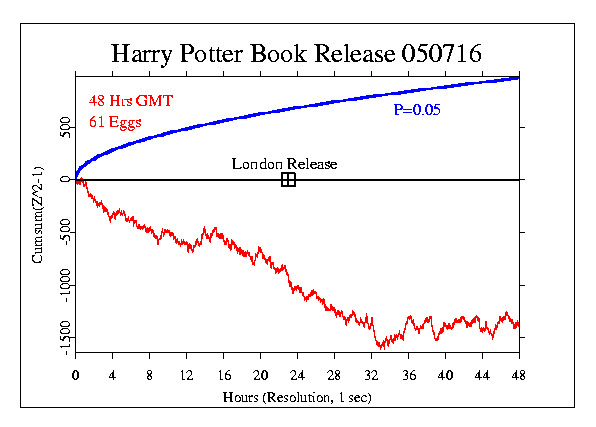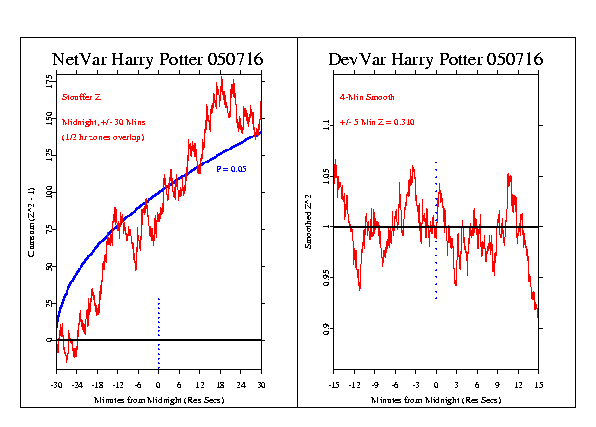|
James said, " But suspending critical thinking for
a moment and supposing one knew what the following sentence actually
means (I'll put quotes around the problem bits): If the GCP is
supposed to detect "large numbers" of "coherent minds," then the world
wide release of Harry Potter VI yesterday must have resulted in some
millions of minds "occupying the same imaginary landscape" for the past
24 hours and more. Any needles flickering?"
Stephan added, "Yes, if I understand GCP Harry Potter should
have blown off the
charts. Ten million (bookseller estimates for the first day of
sales) highly emotionally charged adolescents all experiencing, as
James elegantly puts it "the same imaginary landscape" in such a
short span of time; surely that's an unusual event."
Dick chimed in, "More seriously the Potter event should be
comparable to New Year's
event due to the moment of opening stores moving over the globe.
James wouldn't you start to consider the GCP hypothesis as an
interesting one if that turns out to be true?
Finally, Brian suggested, "Obviously Roger is too busy
either watching the needles/analysing the data, or alternatively
engaged in reading Harry Potter VI himself, to be able to report
the outcome to us :-)
Always willing to oblige serious folk, I responded:
"No, I will be happy to report the outcome, if one or several
of you communally will specify the hypothesis to test:
I need a beginning and ending time for the "event",
as I understand from remarks in this thread is a simultaneous
release in all timezones." [Apparently not the case.]
Alas, nobody was willing to do this, and so the question lay fallow
or was backgrounded in conversations about difficulties some people have
with the GCP hypothesis, and speculations about "Roger's (doubtless
considerable) psi in choosing
the events and their timing plus, likely, the standard multiple
analysis problem."
Until, that is, Charley raised the ante, referring to the
discussion on whether the release of the new Harry Potter book
is an "event" of consequence for all those RNGs around the globe.
He says, "Most seem to think it isn't. Well, I am saddened to
see that so many of my colleagues are just a bunch of fussy
grownups....indeed, a bunch of just plain Muggles! ;-)"
Indeed! Well, you can't have (doubtless considerable) psi power and be a
muggle, so ...
Here's a picture of the NetVar measure (Cumulative Z² - df) for the
15th and 16th of July, GMT. The opening at midnight in London is marked.
This is not a random walk during the 15th and half of the 16th, though
whether the trend has anything to do with the Harry Potter release is
a question we can't answer. It does look like something is driving the
eggs (wiggling the needles) for some 36 hours.
After that the trend goes flat, resuming a random walk.

But the better test of an effect of 'millions of minds
"occupying the same imaginary landscape"'
might be the synchronized openings of bookstores at
midnight, focusing the interest locally. As Dick suggests, this
is conceptually similar to the celebrations at New Years. So, using the
recipes developed for New Years, we get an interesting pair of graphs,
with a suggestive trend around the stroke of midnight for the Stouffer
Z² - 1. The variance around midnight looks random (in contrast to New
Years, where there is a significant drop in variance centered on
midnight).

The suggestion in the brief period made me curious, so I broadened the
time window for the NetVar measure, shown in the next figure. The result is an
impressive trend in the signal average across all time zones. Of course
this post facto exploration cannot be interpreted as evidence for an
effect of the Harry Potter excitement, but it is an interesting picture.

|